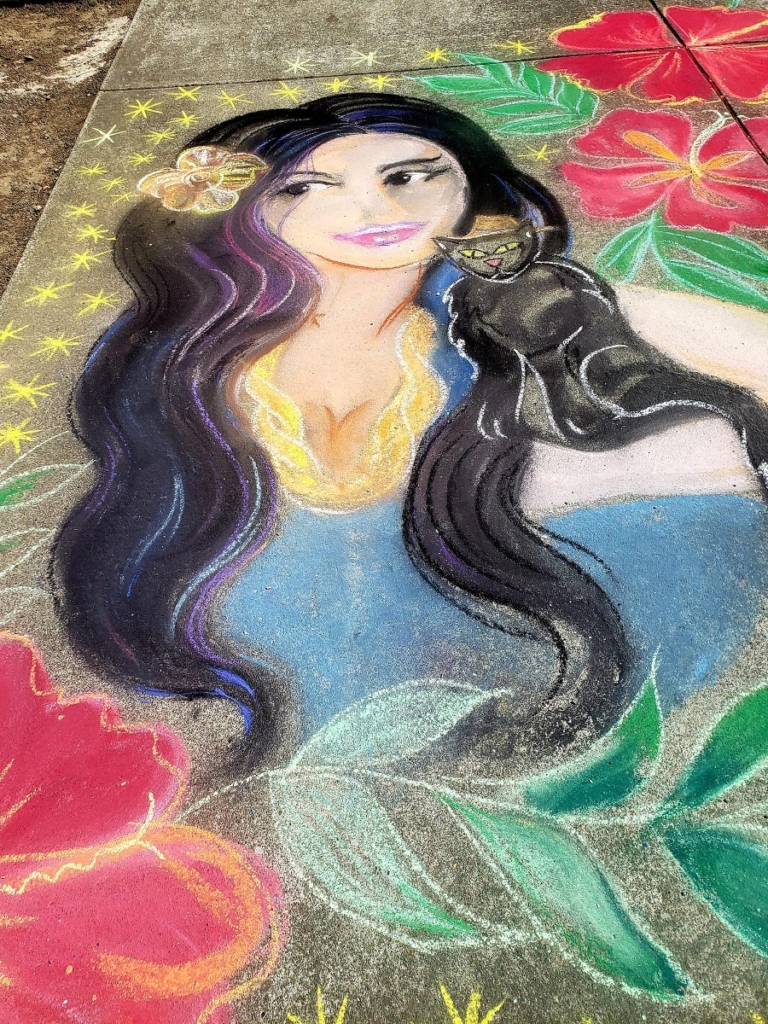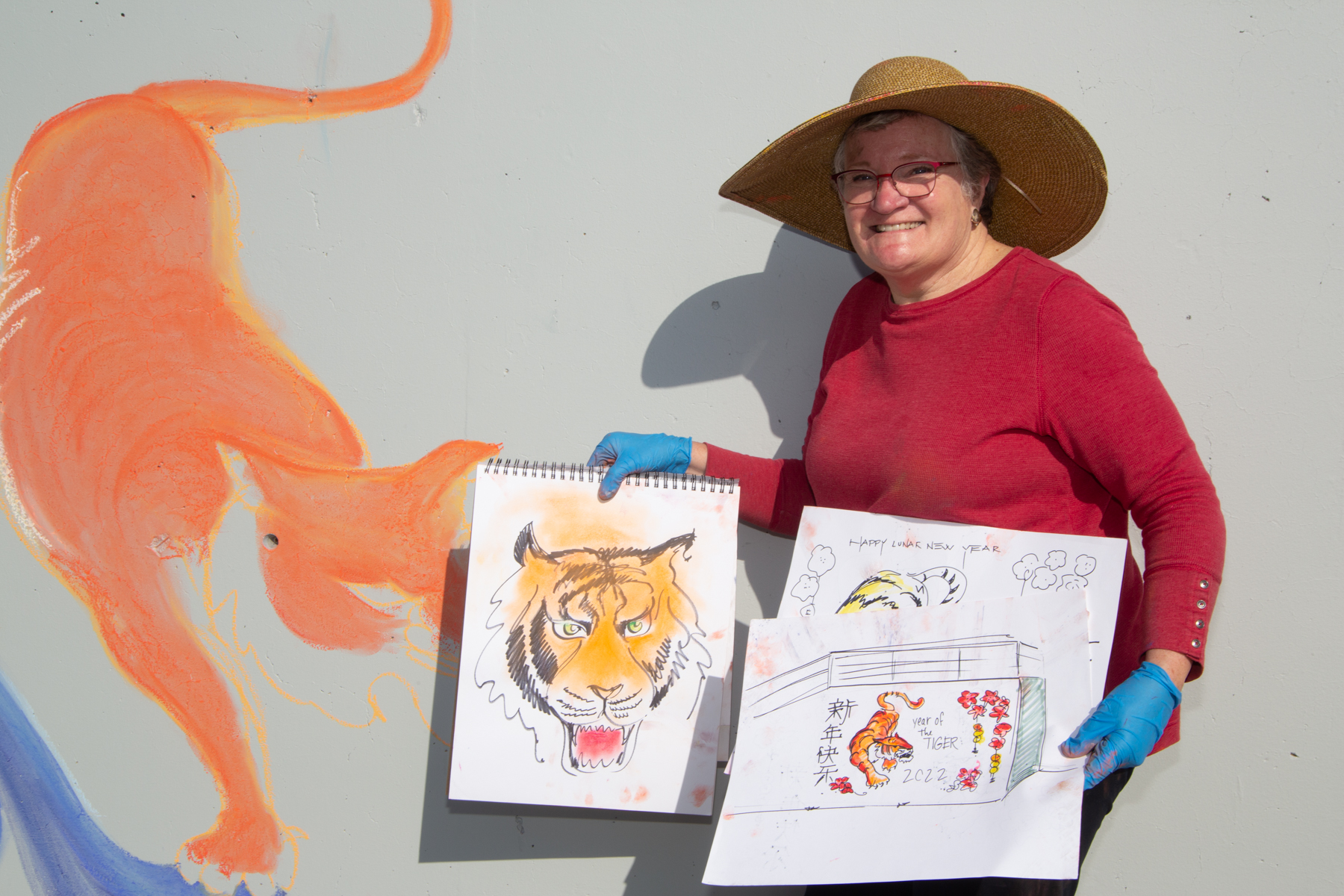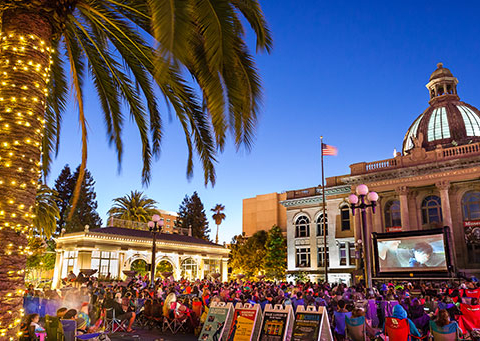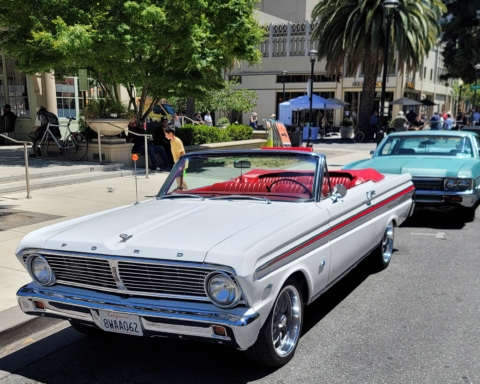Mary Kay Mitchell doesn’t care if people walk all over her art work—in fact that goes with the territory for the Redwood City resident transformed by the Covid pandemic into the artist known as ChalkGranny. A law firm receptionist working at home, she got bored early in the pandemic and one day grabbed her grandson’s chalk to decorate the walkway in front of her Anamor Street home. “I did a couple of ‘Hang in there’ and ‘Cheer up’s’ and then I did a heart with a rainbow and it said, ‘When this is over, what will you remember?’” Mitchell asked herself the same question, and ended up supplying the answer by taking on a new identity as a chalk artist. In the process she’s captured some local fame as a result of the steady stream of projects and commissions she’s completed—everything from sidewalk birthday “cards” to elaborate mini-murals in chalk. Whatever she takes on, says the fun-loving and outgoing Mitchell, “it has to make me laugh.”
Initially, she worked in front of her own house, creating yoga poses in chalk; a parade for the (cancelled) Fourth of July event, with twirlers, Shriners, and band musicians; a solar system; and even hopscotch boards. She set out stones so people could play, and was delighted to watch grandparents teaching their grandkids what hopscotch is. Her husband, Marcos Domingos, would sit out in front of the house while she worked and chat with the neighbors. As people began to notice and her creations appeared on social media, “chalking” requests started to come in. Her website, chalkgranny.com, showcases multiple examples and also answers key questions—like how much does it cost? Her rate is $50 an hour, and ChalkGranny says most projects run $50 to $100. She had been commissioned to create a large and complicated Chinese New Year chalking for the Mandarin Immersion School at Orion School, which included a fierce water tiger and some painstakingly applied Chinese calligraphy. The fee for the artwork for that one was $200. Most of what she earns, Mitchell says, goes for chalk and then to the Second Harvest Food Bank.
—
This story appeared in the March edition of Climate Magazine.
—
“Each piece that I do involves research, tremendous amounts of research,” Mitchell said, as she stood in late January studying the tiger she was creating on a school wall. “I go deep into it and I learn new things. Each piece has given me some insight into culture.” School principal Katherine Rivera sent Mitchell an enthusiastic note of appreciation for the chalking, which debuted in February. “It highlights our school-wide focus on celebrating the cultures and language represented at this school and in Redwood City.”
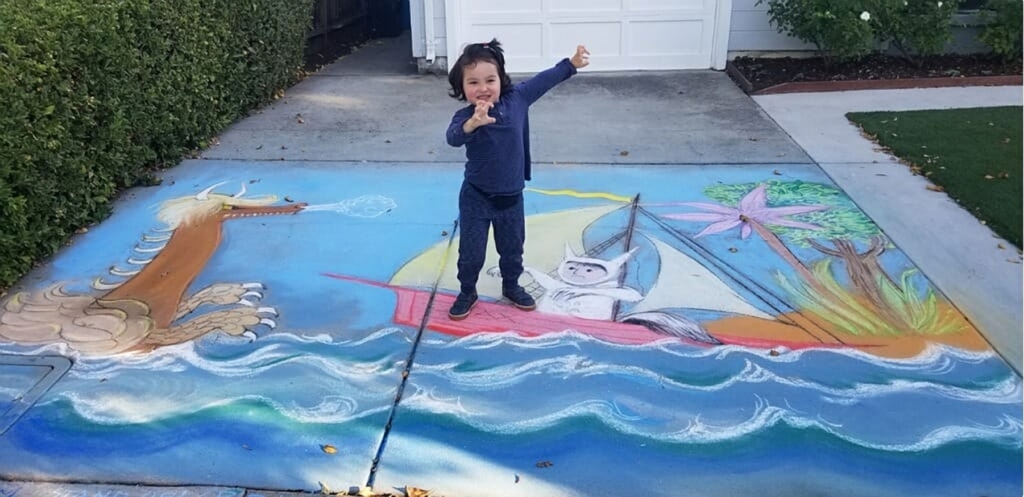
Mitchell, who got her art training at Nazareth College in New York State, has had an eclectic work history. She has taught art but also taught water aerobics (for the YMCA), served as a waitress and then as an event planner. She worked for the San Francisco Chronicle for 25 years, where Mitchell managed the annual Season of Sharing Fund. She’s now employed by the O’Donnell & Associates law firm in Menlo Park as a receptionist and notary. “I love my job,” she says. “But this”—referring to her chalking—“is my own thing.”
When she started chalking, she used the Crayola chalk of 5-year-old grandson Gideon Mitchell. But Mitchell went online and discovered Eternity Arts chalk, produced by a snowplow driver in Michigan who is a “gospel chalker” and teaches people how to draw scenes from the Bible with his chalk. “Let me just say,” Mitchell declares, “this is the chalk of God. Nothing (else) is this good.” When she creates a piece, the colors white and black are applied last. She rubs the chalk in with a sponge or her gloved finger. (You can’t erase chalk.) Having taught yoga and water aerobics, Mitchell says she’s in pretty good shape and can spend two or three hours at a stretch working on a piece, but “I never kneel. If I kneel, I’m never getting up. Ever.” It doesn’t bother her that rain might wash away one of her chalkings or that they aren’t permanent. Far from it: “It’s better for me,” she says. “I’m a real self critic. And if I don’t like it, I’m really glad it goes away.”
Ironically, it’s a worldwide pandemic that has prompted her, and many others, to try to connect with their neighbors and share some fun, Mitchell observes. “People have discovered wonderful new ways to keep themselves engaged in life. The lucky people. Not everybody has the wherewithal to do that.” As the pandemic seems to be winding down, Mitchell won’t be bothered if her chalking days are over, because she has so many other creative outlets, including embroidery and making socks. She might even like to teach chalk art. “Anybody can do it,” she says. “It’s something that you can’t take yourself too seriously. Because it’s chalk. It’s gonna go away. Like Covid. It goes away, hopefully.” And then adds, “A good metaphor.”
